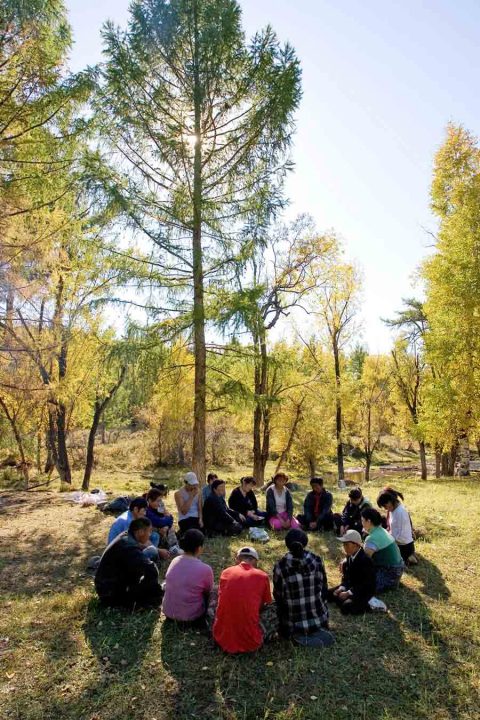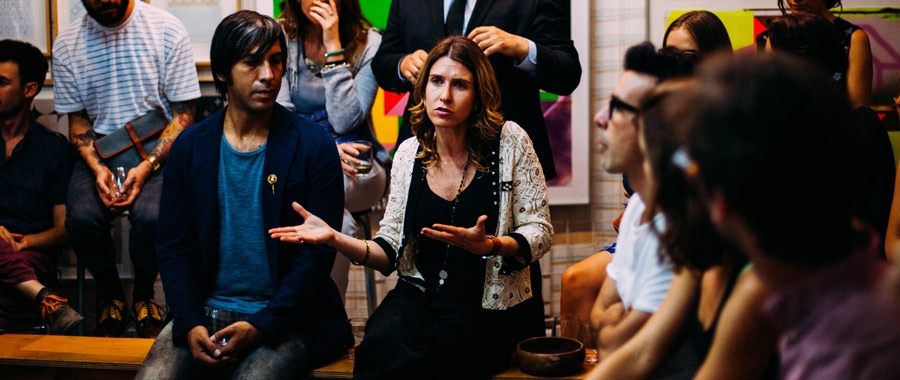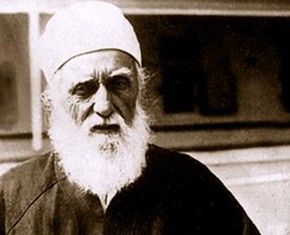The views expressed in our content reflect individual perspectives and do not represent the authoritative views of the Baha'i Faith.
Consultation and universal participation create some of the most fundamental and distinctive aspects of the Baha’i way of life.
Those two concepts constitute the means of collective problem-solving and decision-making within the Baha’i community. Consultation and universal participation, as inseparable as bricks and mortar, together support the edifice of the Baha’i administrative institutions. They are part of the practical philosophy of the religion, and the union of these two concepts allows the Baha’i Faith to progress and develop. Philosophically, they supersede the need for any form of clergy, which is the main reason Baha’is have no pastors, priests, mullahs or ministers. Baha’u’llah, the prophet-founder of the Baha’i Faith explained:
Take ye counsel together in all matters, inasmuch as consultation is the lamp of guidance which leadeth the way, and is the bestower of understanding.
Briefly, Baha’i consultation is more than just a religious council or conference called to consider a particular matter. It is an integral part of the formal and informal decision-making process among all Baha’is, defined by the full and frank participation of the entire community in which every individual has the right and responsibility to have and offer his or her opinion:
Let us also remember that at the very root of the Cause lies the principle of the undoubted right of the individual to self-expression, his freedom to declare his conscience and set forth his views. – Shoghi Effendi, Baha’i Administration
Baha’i consultation is democratic in nature. Democracy means different things to different people, but the process of consultation and the expectation of universal participation within the Baha’i Faith allows people to openly discuss matters of common concern, and ultimately to reach decisions by voting as individuals for ideas.
All leadership within the global Baha’i community rests on these principles – at the local, regional, national and international levels, democratically-elected councils of nine people make the decisions that help guide the Baha’i community. No individuals have any power.
Baha’is vote on the merits of the idea, and not the personality of the one who proposes it. In this sense, Baha’i consultation employs a new and very unpolitical form of democracy. The process tends to unite the participants rather than divide them, and in so doing Baha’i consultation offers a real alternative to traditional political thinking – and in the process opens up a new way of participatory democracy.
Baha’i consultation replaces the mentality which sees as appropriate such devices as partisan bilateral debate, personality attacks, flattery, manipulation, coercion, collusion, corruption, the exchange of political assistance, lobbying, or the development of special-interest groups, political parties, or factions. In the Baha’i Faith, these are seen as ethically bankrupt elements of an old world order. There is no specific step-by-step guide to the process of Baha’i consultation, but the following sequence will give the reader a fairly clear picture of the process:
1. Spiritual and emotional preparation
2. Establishment of mutual trust
3. Frank and non-aggressive participation
4. Collective consideration of ideas
5. Non-personalization of ideas
6. Problem definition
7. Gathering possible solutions
8. Refinement of solution
9. The process of reaching a consensus
10. Humble submission to the will of the majority
11. Collective and affirmative action
This Baha’i consultative process requires both spiritual and emotional preparation. Before the community meets, the individuals pray and meditate to prepare themselves spiritually for consultation. This assures that they are spiritually and emotionally refreshed, and prepared to contribute to the decision-making process. Abdu’l-Baha reminded us about the importance of this step when he said “… true consultation is spiritual conference in the attitude and atmosphere of love.”

The whole process depends upon the establishment of a mutual trust based upon courtesy, respect and the good behavior of the participants. For beneficial consultation, participation must be universal; mutual trust assures universal participation. This is true whether there are two or twenty people involved. Mutual trust is essential because this kind of participation does not mean merely waiting for an opportunity to speak. When one person speaks, all the rest carefully and attentively listen, sincerely trying to understand the point of view of the speaker. During the consultative process, listening constitutes about ninety percent of one’s participation. Once the participants have experienced this process several times with the same people, a profound mutual trust and respect often develop. People feel heard. This trust empowers people to solve the kind of problems which require cooperation.
The Baha’i consultative process always seeks to find the truth, not to force anyone’s opinions. Everyone’s opinion is regarded as equally valid, and as truth is relative to the sum total of collective understanding, the only way to discover what action would be appropriate is to have the frank participation of everyone involved. Each participant offers his or her opinion as an approximation and not an absolute, with the humble understanding that the total result will be greater than the sum of the individual contributions. Baha’i consultation, both frank and loving, is held in a non-aggressive atmosphere in which all the participants tacitly acknowledge from the outset the willingness to change their minds if a better idea emerges. Abdu’l-Baha pointed out that in consultation, opinions clash, not individuals: “The shining spark of truth cometh only after the clash of differing opinions.”
















Comments
Sign in or create an account
Continue with Googleor